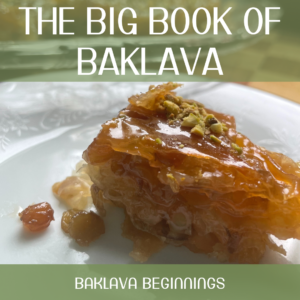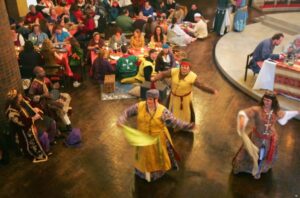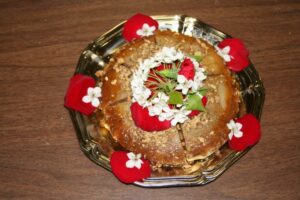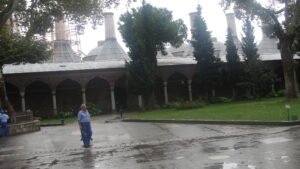
I remember the first time I tasted baklava. I don’t know what struck me first—the alluring crunch of the flaky Filo dough, the toothiness of the nut filling, the unctuous combination of butter and syrup, or the previously unknown to me flavor of a subtle dosing of rosewater. The person who shared this with me was Wissam Nagi, a chef from Lebanon who lived in my hometown of Windsor, Ontario.
She was teaching me several Middle Eastern recipes, and this by far was the one that impacted my new experience the most in this genre of food. I was probably 28 years old. I can still remember the surprise, and the joy, and the excited response that I had (whether that was a sugar high or the ecstasy of a new taste I’ll never know). It would be many, many more years before I began to find and unravel the mysteries of the history of baklava, but it was never far from my mind whenever I worked in food that was culturally-related. In 2006, I was asked to create a historical dinner event (a feast for 150 people at the Episcopalian Cathedral in Kalamazoo MI, which looked a lot like a 1970s Gothic cathedral).

Through the process of developing the recipes of the time period for that feast, I came to recognize that although I believed baklava was ubiquitous to food of the Middle East, there were at that time no recipes that originated prior to the 1800s that we knew of.
I had an inkling that a recipe reported by Hans Derschwam (a 16th Century German ambassador to the Topkapi Palace in Istanbul) for a dish called Gullaç (a starch pancake filled with walnuts, baked and soaked in syrup) was related to baklava.

This recipe was also evidenced by Mohammed Mahmoud al Shivani (the 15th Century author of the first known Turkish cookbook) in the century prior, who said, “The yufka should be as thin as paper. The masters know the quality.” However, there were no recipes that clearly connected the medieval baklava with what we have today—or so I thought.
It was a long journey, and my work on baklava has revolved around connecting the dots from one piece of information to the next, and doing my very best to elaborate on how we can replicate how it was done in the Middle Ages. We knew that they were serving baklava because it was named in multiple sources (for instance, the 15th C Palace records found in Fatih Devri Yemekleri – Dishes of the Conqueror, Prof. Dr. A. Süheyl Ünver, 1952) and other sources like imarets (soup kitchens), accounts of circumcision celebrations, and even literary sources.
